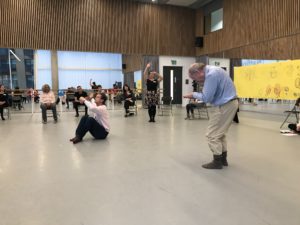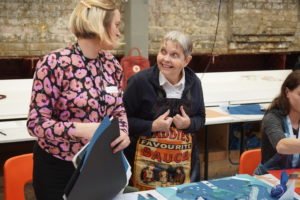Patterns of Perception in Parkinson’s Disease (PoP PD) – Dr Rimona Weil
Dr Rimona Weil, Principal Investigator; Cassandra Hugill, Public Engagement Manager; Joanne Thomas, Public Engagement Coordinator; Anne Marr, Artist; Ru O'Connell, Artist; Moise Roche, Consultant; Parkinson's UK
Wellcome Enrichment, Public Engagement – £81,562
A project focused on supporting dialogue and raising awareness of dementia within the Parkinson’s community has been funded by a Wellcome Research Enrichment – Public Engagement grant.
Dr Rimona Weil, Principal Investigator of the Wellcome Centre for Human Neuroimaging’s Vision in Parkinson’s Disease research team and a Principal Investigator at the UCL Dementia Research Centre, will lead the project, which aims to better involve patients in research targeting dementia in Parkinson’s.
Dr Weil and her team will work with leading charity Parkinson’s UK, Central Saint Martin’s Programme Director Anne Marr, Artist Ruairiadh O’Connell and Moïse Roche, an expert in working with Black and Minority Ethnic communities around prevention, detection and management of dementia.

Building on the success of last year’s Patterns of Perception, this new project will begin with a series of workshops, run by artists Anne Marr and Ruairiadh O’Connell. Participants will include people with early-stage Parkinson’s, people with Parkinson’s dementia, and carers or loved ones of people with Parkinson’s. Through creative activities, the workshops will explore fears around discussing dementia in the context of Parkinson’s disease.
Using knowledge gathered in the workshops, the team will then produce an information toolkit for Parkinson’s patients and carers, and a clinical toolkit to help clinicians open up conversations with patients. The charity Parkinson’s UK will embed the toolkits within their information and support materials as part of a campaign to raise awareness of the risk of dementia in Parkinson’s.
Cassandra Hugill, Public Engagement Manager at the Wellcome Centre for Human Neuroimaging is looking forward to exploring how the project can empower people with Parkinson’s:
‘This project is an illustration of what meaningful public engagement can be. Through this work, we will be bringing together people from a range of areas of expertise, recognising the value of diversity in voices and experience. The toolkits created will help to open these important dialogues around the very real risk of dementia in people with Parkinson’s.”
Dementia is a common complication of Parkinson’ disease: it is six times more likely in people with Parkinson’s than in the general population. Despite this, professionals working with the Parkinson’s community are often hesitant to discuss dementia with patients out of concern that they will respond negatively.
Project lead, Dr Rimona Weil explains:
“Dementia can feel like a new trauma for patients who have just become accustomed to living with Parkinson’s. However, we need to talk about cognitive decline in Parkinson’s to engage patients in the research. In clinic, early conversations about Parkinson’s dementia can help patients gain access to appropriate support, prepare for the future, and benefit from treatments to slow progression of dementia in Parkinson’s. Our project aims to identify roots and triggers of discomfort linked with the concept of dementia within the Parkinson’s community and to co-produce information resources to support dialogue and awareness of dementia in Parkinson’s.”

By encouraging conversations about Parkinson’s dementia, the project aims to help patients gain access better and earlier care. The team also hope to engage people with Parkinson’s in research seeking to understand the causes and develop ways to treat cognitive decline in Parkinson’s.
Moreover, the project will put diversity at the forefront by prioritising connections with marginalised groups with the support of Mr Roche. People from Black communities are often underrepresented in Parkinson’s and dementia research. Moïse Roche of the UCL Division of Psychiatry, works to improve dementia services for Black families, and will provide expertise and guidance to ensure the project has strong Black representation.
Awarded Mar 2021
